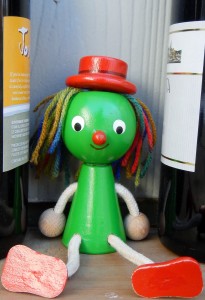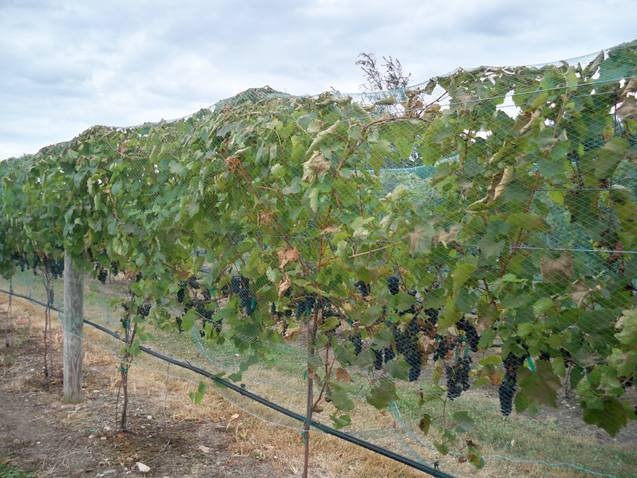Between Two Bottles (B2B): Norton versus Diet Coke
Not everyone visiting a local winery wants to drink wine. Beverage drinkers divide into a number of categories. A large number choose beer or mixed drinks. Non-drinkers ask for soda or water.
 Among the soda and water drinkers there is an interesting sub-category: those against alcohol for religious reasons. For example, we’ve hosted a few weddings during the last couple of years where either the bride’s or the groom’s family were against alcohol and somehow the other side of the family conspired to have the wedding at a winery! (Perhaps to really annoy their new relatives?) The non-wine-drinking family ordered their sodas with a particularly disapproving look.
Among the soda and water drinkers there is an interesting sub-category: those against alcohol for religious reasons. For example, we’ve hosted a few weddings during the last couple of years where either the bride’s or the groom’s family were against alcohol and somehow the other side of the family conspired to have the wedding at a winery! (Perhaps to really annoy their new relatives?) The non-wine-drinking family ordered their sodas with a particularly disapproving look.
The most popular non-alcoholic drink we pour is Diet Coke. I’ve always felt the words on the can should have a question mark after them. Studies have raised so many doubts about the possible health impacts of the artificial sweeteners in diet sodas. It seems disingenuous to have a word like ‘diet’ on the can, implying you’re doing your body some sort of favor.
This is the beginning of an argument that might convince at least some soda drinkers to move into the wine camp. For those who oppose alcohol for religious reasons, can I very respectfully suggest: is it not likely that Jesus drank wine at the Last Supper? And didn’t one of Jesus’s miracles involve turning water into wine? Could this suggest that wine in moderation is a good thing? Okay, these arguments might not work.
But for the customers who request diet sodas like Diet Coke for health reasons, a comparison of the ingredients in diet sodas versus a glass of wine, should make it clear which is the healthier drink.
If the pop industry’s healthiest drink is diet sodas, the wine industry’s healthiest drink is Norton. Among red grape varieties, Norton is known to have particularly high levels of the anti-oxidant resveratrol. Studies have shown that this natural chemical prevents the build up of plaque in arteries, lowering cholesterol levels and the risk of heart disease.
About 75% of the wine in your glass is water and most of the rest, according Iowa State University’s Extension and Outreach Director and Enologist Dr. Murli Dharmadhikari, consists of naturally occurring sugars, organic acids, phenolic compounds, nitrogenous compounds, aroma compounds, minerals and pectic substances, in other words, natural fruit juice. Of course, wine isn’t a completely healthy drink — the alcohol content means it does need to be taken in moderation. There are also very tiny amounts – a few hundred parts per million – of less desirable chemicals like sulfur dioxide to preserve the wine.
But compare that to sodas like Diet Coke. While sodas can claim to contain more water than wine does – about 99% – the remaining 1% is a cocktail of unhealthy additives including caffeine, caramel coloring, aspartame, phosphoric acid, potassium, benzoate and something called Phynelketonurics. Studies have linked aspartame to hyperactivity, shorter attention spans in children and, despite the impression given by a sugar free drink, the sort of increased blood glucose levels that can lead to diabetes. According to the National Toxicology Program in a 2004 study, a chemical in the caramel coloring called methylimidazole, ’caused increased rates of cancer of the thyroid gland and liver in rats and mice.”
For health reasons, a glass of wine beats soda hands down. A glass of the Midwest’s Norton wine beats all other wines hands down.
Danny Wood is an editor of Midwest Wine Press and works part-time at Belvoir Winery in Liberty, Missouri.



I’ve been saying this for 10 years! Now I’m validated in print 🙂 Thanks!
Thanks, Danny! This is great news as we are growing Norton vines. Do you have a source for Norton stats, specifically resveratrol numbers?
Hi Rebecca,
Thanks for your interest. I only really have trustworthy secondary sources for that resveratrol stuff, but one of them tells me that the place to find Norton information like that is the Missouri Wine Research Station. There’s also the Center for Grapevine Biotechnology at Missouri State University. I think they may have actually done that resveratrol research (or at least have looked very closely at the Norton vine). They’re very friendly and I’m sure if they can’t give you all the Norton information you need, they could tell you where to get it. Here is the link with contact information: http://ag.missouristate.edu/cgb/
kind regards, Danny (using Mark’s log-in)